Chaim Shapiro
Values Codes I – H – E – L – P
Chaim (Khayim) Shapiro was born in the Russian Empire in 1886.
When he was just fifteen years old, rumors of an imminent pogrom led Chaim and his older brother, Aaron Shapiro, to organize their community in self-defense.
Along the way…
Aaron Shapiro was later to be sent to Siberia, but escaped arrest by fleeing to New York City in 1904. He worked as a newsboy for a Mr. Kraus, who was suffering from tuberculosis.
Chaim joined his brother two years later, after being released from a six-month prison term for his participation in the 1905 Russian Revolution.
The brothers split a paper route, which enabled them to continue their education and their involvement in Poalei Tziyon (Workers of Zion), a Marxist-Zionist organization.
Los Angeles
Around 1908, Mr. Kraus left New York to receive treatment at a Jewish sanatorium in Denver, Colorado. He died a little while later. Aaron Shapiro brought Kraus’ daughters, Jennie and Rose, to Los Angeles, and Chaim soon joined them.
Aaron and Chaim graduated law school at the University of Southern California, passed the bar, and co-founded a law practice. They developed a reputation for defending labor groups and political activists.
Before dying suddenly at age fifty, Aaron helped found the Los Angeles branch of the Zionist Organization of America and was president of the Zionist District of Los Angeles.
Chaim Shapiro’s activism in Jewish and socialist causes continued throughout his life.
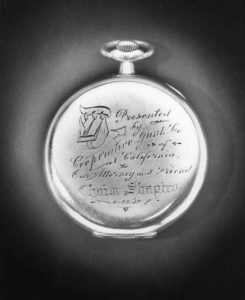
Pocket watch, presented to Chaim Shapiro, “Our Attorney and Friend,” by the Cooperative Junk Co. of California, June 28, 1919, #WS3824-26
He was a founding member of the local branch of the Yiddishist-Socialist Workmen’s Circle (Der Arbeter Ring), principal of the city’s first Yiddish school, director of the Jewish Consumptive Relief Association (today’s City of Hope), president of the Los Angeles chapters of the Israeli General Federation of Labor (Histradut) and Society for Trades and Agricultural Labor (ORT), board member of the Jewish Community Council and Bureau of Jewish Education, founding member of the local branch of the YIVO Institute of Jewish Research, and chairman of the United Anti-Nazi Conference, among other involvements.
1930 California Gubernatorial Race
The 1930 California gubernatorial race included candidates from the Socialist Party. Upton Sinclair, the renowned muckraker and novelist best known for The Jungle (1906), ran for governor, and Chaim Shapiro ran for lieutenant governor.
Shapiro was featured in a Jewish Telegraphic Agency story highlighting “Six Jewish Candidates in Los Angeles Primaries” (August 24, 1930):
Charles A. Son, member of one of the oldest Jewish families in California, is among the six Jewish candidates listed for the city primaries, which will be held Aug. 26. Mr. Son is a candidate for nomination for the post of attorney general. William Bronstein and Milton M. Golden, attorneys active in Jewish circles, are on the ballot for seats in the assembly, while Harry Lyons, who for the past several terms has been the only Jewish assemblyman from the southern part of the state, is seeking reelection. L. H. Phillips is seeking the nomination for judge of the Superior Court. Chaim Shapiro, former president of the Jewish Consumptives’ [sic] Relief Association, will seek the office of lieutenant governor on the Socialist ticket.
Sinclair and Shapiro shared a campaign leaflet for the 1930 gubernatorial race, which described them as:
Not politicians, but social engineers, understanding the needs of humanity. Devoting their lives to the cause of Socialism has made them better men. When voting for them you are not only voting for real men but also for the principles for which they stand.
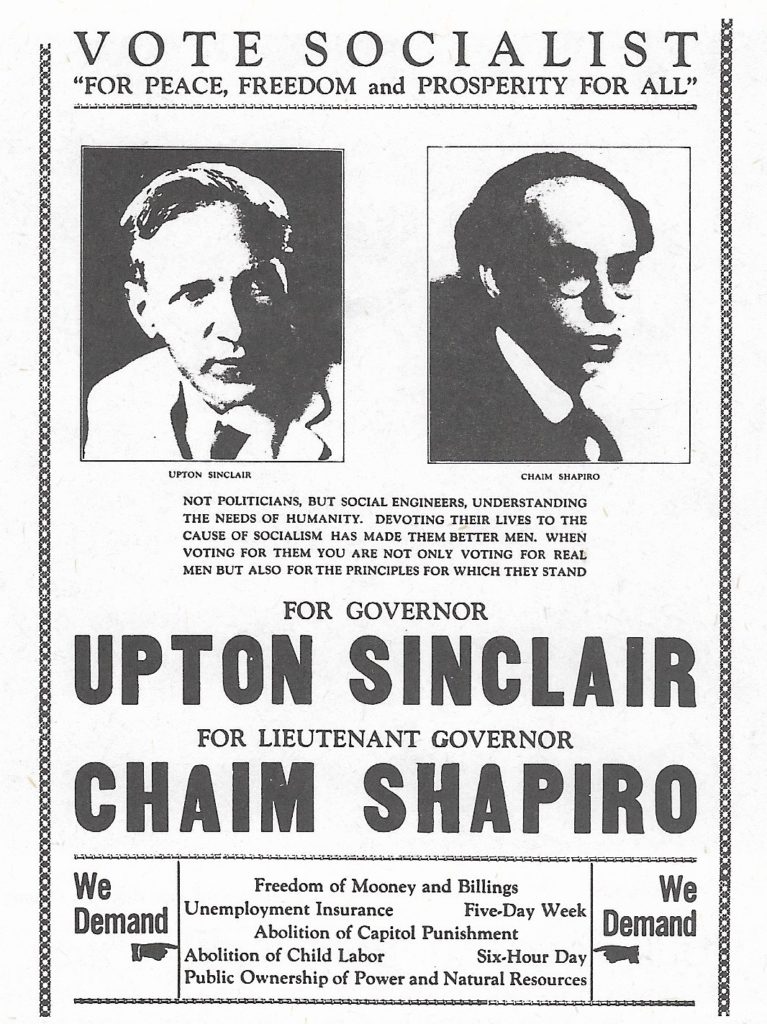
Upton Sinclair and Chaim Shapiro, leaflet, California gubernatorial campaign, 1930, Western States Jewish History Association Archives
The pair lost in a Republican landslide. James Rolph Jr., the longtime mayor of San Francisco, received over 72% of the vote for governor. Sinclair received under 4%.
Sinclair again ran for California Governor in 1934, this time as a Democrat on the platform of End Poverty in California (EPIC). He earned the party’s nomination, but lost to incumbent Frank Merriam (Rolph Jr. died while in office on June 2, 1934).
1933 Los Angeles Mayoral Primary Election
Chaim Shapiro remained active in the Socialist Party of America. He was among the California delegates to the party’s 17th convention in Milwaukee, Wisconsin, held on May 20-24, 1932. The state’s nineteen delegates included six Jews: Shapiro, A. Levin, Julius Levitt, David Lyon, Mervin Levy, and Sam Weisenberg.
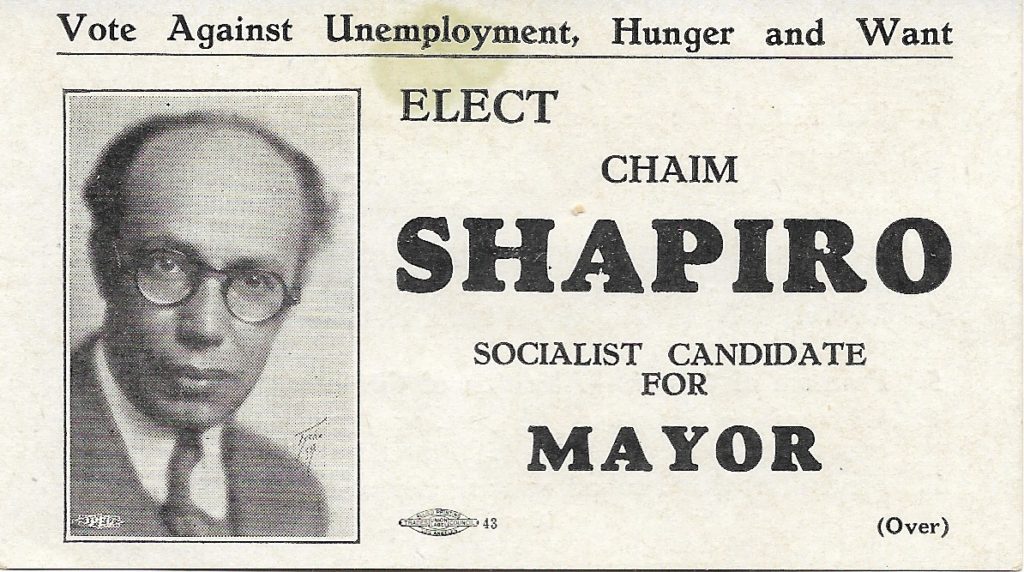
Chaim Shapiro, card (front), Los Angeles mayoral campaign, 1933, Western States Jewish History Association Archives
Shapiro ran as a Socialist candidate during the Los Angeles mayoral primary election on May 2, 1933. He was up against nine other candidates: two Republicans, two Democrats, four Independents, and one Communist. Shapiro came in seventh with just 1.42% of the vote. Incumbent Democrat John Clinton Porter went on to defeat Republican Frank L. Snow in a run-off election.
Shapiro was not discouraged by political defeats. He continued to work arduously on behalf of workers and Socialist ideals.
He died in Los Angeles in 1966 at the age of seventy-nine.
Shapiro’s political philosophy was printed on the back of his campaign card for the 1933 mayoral race.
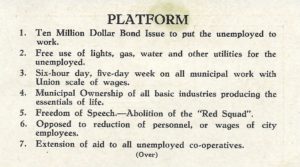
Chaim Shapiro, card (back), Los Angeles mayoral campaign, 1933, Western States Jewish History Association Archives
PLATFORM
1. Ten Million Dollar Bond Issue to put the unemployed to work.
2. Free use of lights, gas, water and other utilities for the unemployed.
3. Six-hour day, five-day week on all municipal work with Union scale of wages.
4. Municipal Ownership of all basic industries producing the essentials of life.
5. Freedom of Speech.—Abolition of the “Red Squad.” [Police units that gathered intelligence on political and social groups.]
6. Opposed to reduction of personnel, or wages of city employees.
7. Extension of aid to all unemployed co-operatives.
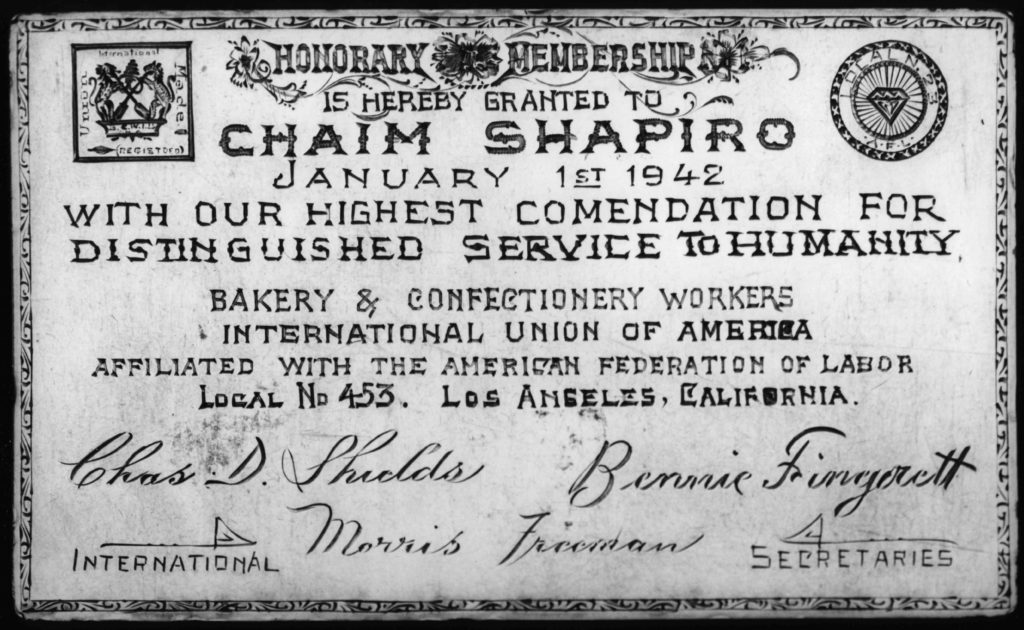
Chaim Shapiro, honorary membership card, Bakery & Confectionery Workers International Union, 1942, WS3825-26
Sources
- Norton B. Stern, ed., The Jews of Los Angeles: Urban Pioneers (Los Angeles: Southern California Jewish Historical Society, 1981).
- Caroline E. Luce, “Jewish Socialists in the Land of Sunshine: Freedom, Springtime and the Pesakh Spirit of the Future,” Shofar 35:4 (2017).
Jonathan Friedmann is the curator of this Chaim Shapiro exhibit.
